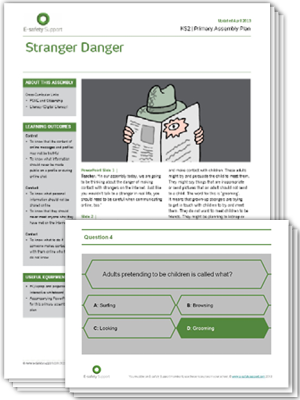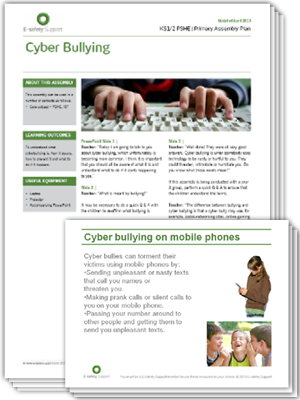Safeguarding Essentials Resources - Primary Assembly Plans
Primary Assembly Plans
Safeguarding Essentials has 15 primary assembly plans - scroll down for details and samples
Assembly is an ideal time to cover safeguarding or e-safety issues with year groups or the whole school, which is why we have developed these assembly plans for introducing students to, or reminding them of, safeguarding and e-safety issues. You can pick and choose an assembly as a "one off", or use them in sequence throughout a term. Each of our primary assembly plans includes a PowerPoint presentation for the students, and an easy to use script for the teacher. You can of course amend the PowerPoint if you wish to suit your own particular needs. The assemblies are designed to be used by non-specialists, so you don't have to worry about being a safeguarding or e-safety expert prior to using them. Each assembly plan lasts around 10 - 15 minutes, so fits in easily to most school assembly slots.
Displaying Primary Assembly Plans

A useful assembly for an e-safety recap or introduction, this assembly raises key online safety issues such as cyber bullying, security, inappropriate content, trolls, plagiarism and bogus websites. The teacher takes the children through each issue and helps them to understand how they can avoid it, or deal with it. The assembly includes a script for the teacher, and a PowerPoint presentation for the children.

In this assembly, children at key stage 2 are encouraged to think critically about information they source online. Using an excellent spoof website about the endangered “tree octopus”, the teacher demonstrates how young people can tell that information is incorrect.
They are also introduced to the idea that Wikipedia isn’t always the best source of information, and that communications such as chain emails or texts should be ignored. The assembly closes with a number of top tips for helping children to decide if a website is genuine or not. This assembly includes a PowerPoint presentation for displaying at the assembly and a script for the teacher.

This assembly helps young people to understand the risks and consequences of illegally listening to music online, of downloading music illegally and copying downloaded files. It also touches upon the illegality of uploading copyrighted content. The teacher explains the risks, the possible consequences, and how to avoid illegal downloads. The assembly comes with a script for the teacher and a PowerPoint presentation to use with the children.

Young people spend increasing amounts of time online, as well as watching TV and instead of playing outdoors. This assembly raises the issue of being addicted to using the Internet, whether it is for social networking, gaming or research. The teacher explores possible consequences of Internet addiction, including social and health impacts, and offers advice on reducing time spent online. The assembly includes a PowerPoint and a script for the teacher.

Many younger children are exposed to film, TV and gaming content that is certified as being suitable for much older young people. Younger boys in particular will be keen to play online or console games that have a 15 or even 18 certificate. These games will have violent or sexual content that is entirely inappropriate for younger children. In this assembly children learn about the BBFC and PEGI classifications, why they exist, and how they work. They also consider the implications of watching films or TV shows that have been illegally downloaded. The assembly includes a PowerPoint and a script for the teacher to read from, or use as a starting point.

By key stage 2, pupils should be well aware of the risks of stranger danger online. This assembly reinforces understanding and awareness about grooming and inappropriate contact. The assembly concludes with a fun "Who wants to be a Millionaire" style quiz.
-
 Teacher Script for Stranger Danger
Teacher Script for Stranger Danger
-
 PowerPoint Presentation for Stranger Danger
PowerPoint Presentation for Stranger Danger
-
 PowerPoint Presentation for Stranger Danger - Part 1
PowerPoint Presentation for Stranger Danger - Part 1

This primary assembly resource, which engages with the PSHE curriculum, allows a KS2 primary teacher to focus on developing children’s awareness and understanding of cyber bullying and the importance of staying safe when using technology to communicate.
The assembly aims to provide advice and explanation about cyber bullying without frightening primary-age children. The assembly then develops the primary children’s awareness of the issue by explaining how varying forms of cyber bullying occurs through different technologies such as mobile phones, social-networking and online gaming.
Primary school teachers will be able to use this idea for an assembly to give the children the information, awareness and capability to know if someone is cyber bullying them or if a friend is being targeted. Through the assembly, the children will know how to react to cyber bullying and the appropriate actions to take.

This assembly can be used to support the school’s safeguarding work and to ensure that pupils feel confident to speak out if they have worries or concerns and know who to approach.
The aim of this key stage 1 and 2 assembly is to ensure pupils feel safe and know what to do if/when they do not.
-
 Teacher Script for Safeguarding Assembly
Teacher Script for Safeguarding Assembly
-
 PowerPoint Presentation for Safeguarding Assembly
PowerPoint Presentation for Safeguarding Assembly

This assembly provides pupils with an understanding of what drugs are (including alcohol and tobacco) and the physical consequences of taking controlled substances.
Pupils are encouraged to consider things that make them feel good, to help them compare the physical feelings against the negative effects of drugs.
-
 Teacher Script for Drugs Assembly
Teacher Script for Drugs Assembly
-
 PowerPoint Presentation for Drugs Assembly
PowerPoint Presentation for Drugs Assembly

This key stage 1/2 assembly is designed to help younger pupils understand that not all illnesses have physical symptoms. It introduces the idea of mental well-being and discusses ways to help maintain good mental health.
-
 Teacher Script for Mental Well-being Assembly
Teacher Script for Mental Well-being Assembly
-
 PowerPoint Presentation for Mental Well-being Assembly
PowerPoint Presentation for Mental Well-being Assembly

This key stage 2 assembly is designed to help pupils develop an awareness of FGM, what it is, where and why it happens as well as knowledge of where to seek help and advice.
-
 Teacher Script for FGM Assembly
Teacher Script for FGM Assembly
-
 PowerPoint Presentation for FGM Assembly
PowerPoint Presentation for FGM Assembly

This assembly will help pupils develop their awareness of what alcohol is. They will also learn about the rules about young people and alcohol and the physical effects of drinking alcohol.
The assembly includes some open questions to help engage the pupils in the assembly.
-
 Teacher Script for Alcohol Assembly
Teacher Script for Alcohol Assembly
-
 PowerPoint Presentation for Alcohol Assembly
PowerPoint Presentation for Alcohol Assembly

In this assembly designed for key stage 2, pupils are given an understanding about the risks of sharing information via the Internet (primarily images). They will also be introduced to why it’s not always appropriate to share and learn about privacy settings.
-
 Teacher Script for Sexting Assembly KS2
Teacher Script for Sexting Assembly KS2
-
 PowerPoint Presentation for Sexting Assembly KS2
PowerPoint Presentation for Sexting Assembly KS2
- Safeguarding & E-Safety:
- Online Checklist
- Guidance Documents
- Support and Advice
- News & Information Widget
Get started with free safeguarding and e-safety guidance and articles in our regular email updates and special reports.
Join as a E-safety Support member for access to Internet safety specific online training modules for staff, governors, pupils and parents, school e-safety policies, lesson plans and teaching resources.
Join our full Safeguarding Essentials service for all the fantastic e-safety resources, plus more online training, classroom resources, policies and parent guides covering the wider safeguarding topics.
Discounts available for school groups, small schools and special needs schools - please call 0113 526 5980
* All prices are shown excluding VAT. This is a subscription product with an automatic annual renewal.
Renewal can be cancelled at any time up until midnight on the last day of the current subscription.

